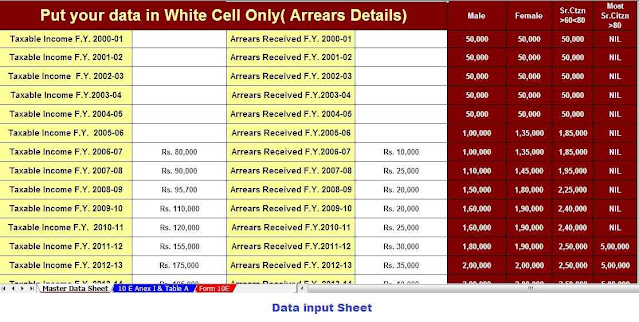Income tax exemption within 80. Once you start earning, you need to understand your tax liability,
how much you have to pay and how much you can save. It sounds complicated enough, but it doesn't
have to be. The government has given many exemptions under various sections of the Income Tax Act,
which you can take yourself.
But to do this you must first understand what the different sections of the Income Tax Act have to offer. One of them is Section 01 of the Income Tax Act. Under Section 80, there are various options for investment deduction, premium payment, loan repayment etc.
If your annual income makes you liable to pay higher income tax, then it is time to consider Section 80.
Section 80C. Income tax deduction under
You may also, like- Automated Income Tax Preparation Excel Based Software for the Non-Govt employees for theF.Y.2021-22 as per the new and old tax regime
Tax Saving FD: By investing in these you will get double the benefit of tax exemption and higher return. Tax saving FD is an ideal investment option for those who want to invest their money in low-risk instruments.
P.P.F. is one of the tax saving options for many investors and taxpayers. Since this is a government-established savings scheme with a maximum term of 15 years, your money is not only safe but also guaranteed return. Interest earned on PPF is tax-free.
N.S.C.: Another option is to choose NSC Max to limit Rs. 1.5 Lakh.
L.I.C.: Max Limit Rs. 1.5 Lakh U/s 80C
Home Payments: The premiums paid for the capitalization of your home loan are eligible for a tax deduction.
Pay tuition fees: If you pay a certain amount for yourself, your spouse or children, you can claim a tax deduction
• EPF (Employee Provident Fund): Under the Employees Provident Fund Act, about 12% of the employee's salary fund is contributed to the employees' provident fund investment. This contribution is eligible for an employee tax deduction.
You may also, like- Automated Income Tax Preparation Excel Based Software for the
Senior Citizen Savings Scheme: If you invest in SCSS as an investment or are planning to retire, this amount may be claimed as a deduction under Section 80.
Section 80 of the Income-tax Act proposes to reduce the contribution to the CCC pension fund - if you invest in a pension scheme paid by public or private sector insurers, the premium you pay for this fund can be used to claim deductions under Section 80 C. .80 CCC. . It comes within the maximum money range. 1.5 lakh
The Income Tax Department gives a discount on the premium paid for 80D medical insurance - you will get Rs. 25,000 in any financial year. This insurance policy can be for you, your spouse or your children. If one of the insured members is 60 years of age or above, the tax-deductible will be Rs. 30,000 additional tax deduction on parental medical insurance Rs. 25,000. In this case, the age of the parents is 60 years or more; You can claim up to Rs 30,000. The maximum allowable discount under section 80D is Rs. 60,000.
Section 80E of the Income Tax Act exempts interest paid on education loans taken for higher education. So, if you provide an education loan for higher education for yourself, your wife or your children, you can claim a tax deduction on the amount of interest paid for it.
Section 80GG: Those who are not getting any House Rent from their Employer, can use this section 80GG. Max Rs.2000/- Per Month or Rs.60,000/- per annum.
Under Section 80U Max Limit Rs.75000/- for below 60 years and Rs.1.5 Lakh for the Senior Citizen above 60 Years






0 Comments